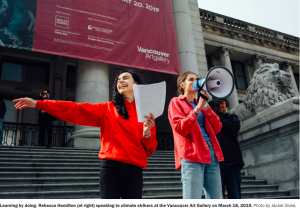Deeper Reflections, Youth & Transformation
Youth as empowerment
I am not a leader in the environmental educational moment. Youth are the leaders. Indigenous folks have always been leading, alarming us, but we are only starting to listen. When I facilitate climate change programming in elementary and high school classrooms (goal to teach about climate change education with British Columbia Sustainable Energy Association) the first thing I share with students is that I am not an expert. I am a white-settler, who is partly responsible for the climate disaster. The leaders are students, are young people who will inherit the problem (and creative opportunity) that adults created for them. I share with the students I am only here to share with them what I have learned from listening to scientists, Indigenous folks, and youth. Whose voice have I missed?
Does more knowledge actually activate change?

Greta Thunberg
Not necessarily! I truly believe that more knowledge does not always result in action or different outcomes. Greta Thunberg states: “People tell me I should study to become a climate scientist so I can solve the climate crisis. But the climate crisis has already been solved. We already have all the facts and solutions. All we have to do is wake up and change.” Place-based education can provide students with the opportunity to engage in the change, rather than continuously prepare with little to no action.

They Call Themselves Sustainabiliteens and They Are Formidable, February 7, 2020, The Tyee
Darron Kelly from Memorial University and Sharon Pelech at the University of Lethbridge, analysis of students as participants in the decision-making processes is also salient. They say: “The critical aim, made possible by this pedagogical viewpoint, is to establish place-conscious education as an important means of guiding and supporting an emancipatory conception of student agency – a conception that positions youth as sources of their own learning, and as central actors for positive social and environmental change.” The themes that emerge here are agency and collaboration, rather than individualism.
Youth are the source of their own learning and, this is not exclusive to young activists like 16-year-old Greta Thunberg and our very own Indigenous activist Autumn Peltier (age 15), but with youth as a whole. Millions of students walked out of their classrooms on September 27th for Friday for Futures demanding a new reality.
Sustainabiliteens started in a Vancouver highschool by Rebecca Hamilton (grade 11 student, seen in the image above on the right side), who started the club in grade 10 because she was inspired by Greta, is arguably responsible for the Vancouver climate strikes. She and her peers – a group of grade 9-12 students now expanding across British Columbia are educating the masses about climate change, and most importantly are mobilizing change. They are the central vehicle of ‘actors for positive social and environmental change.’
Reflection Resources
Darron, K. and Pelech, S. (2019). A Critical Conceptualization of Place-Conscious Pedagogy. European Journal of Curriculum Studies (5)1, pp.732-741.
Smith., G (2002). Place-Based Education: Learning to Be Where We Are. The Phi Delta Kappan (83)8, 584-594.